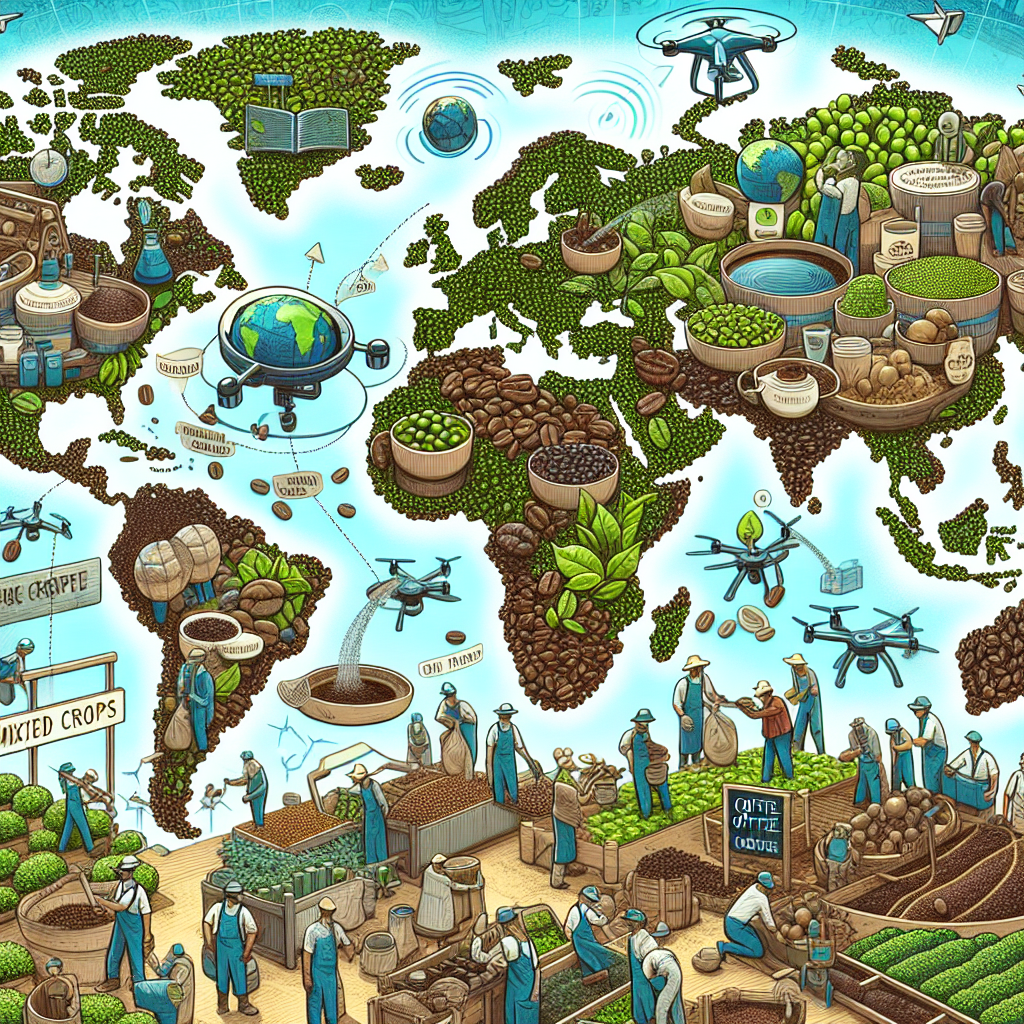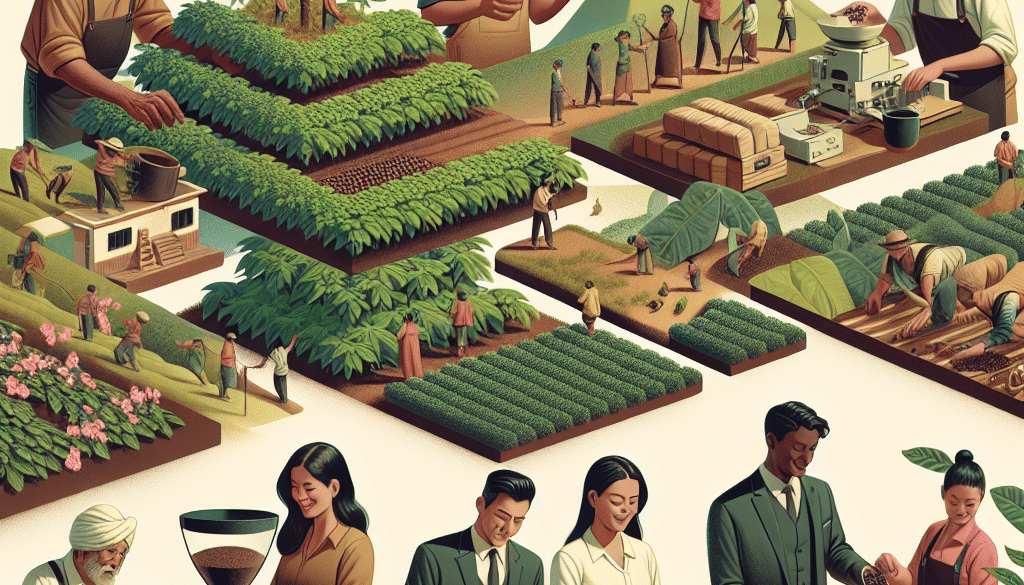Tackling Coffee Production Challenges with Sustainable Sourcing
-
Table of Contents
- Sustainable Sourcing in Coffee Production: Addressing Key Challenges
- The Current State of Coffee Production
- Embracing Sustainable Sourcing Practices
- Case Studies and Success Stories
- Challenges to Implementing Sustainable Sourcing
- How Consumers Can Support Sustainable Coffee
- Conclusion: The Future of Coffee Lies in Sustainability
- Discover ETprotein’s Sustainable Protein Products
Sustainable Sourcing in Coffee Production: Addressing Key Challenges

The global coffee industry is facing a multitude of challenges, ranging from environmental concerns to social issues. As one of the most beloved beverages worldwide, coffee plays a significant role in the lives of millions, from farmers to consumers. However, the sustainability of coffee production is under threat due to factors such as climate change, deforestation, and unfair labor practices. In this article, we will explore the challenges of coffee production and how sustainable sourcing can provide solutions, ensuring the longevity and health of the coffee industry.
The Current State of Coffee Production
Coffee is cultivated in over 70 countries, primarily within the equatorial regions known as the “Bean Belt.” The industry supports the livelihoods of around 25 million farmers, most of whom are smallholders. Despite its popularity, coffee production is fraught with difficulties:
- Environmental Impact: Traditional coffee farming methods can lead to deforestation, soil degradation, and biodiversity loss.
- Climate Change: Coffee plants are sensitive to temperature changes, with global warming threatening coffee yields and quality.
- Economic Sustainability: Volatile market prices and the lack of fair trade practices leave many coffee farmers in poverty.
- Social Issues: Child labor and inadequate working conditions are prevalent in some coffee-producing regions.
These challenges necessitate a shift towards sustainable sourcing practices that can secure the future of coffee production while protecting the environment and improving the lives of farmers.
Embracing Sustainable Sourcing Practices
Sustainable sourcing in coffee production involves implementing practices that are environmentally sound, socially equitable, and economically viable. The following are key components of sustainable sourcing:
- Environmental Stewardship: Adopting agroforestry and organic farming methods to preserve ecosystems.
- Social Responsibility: Ensuring fair wages, safe working conditions, and community development.
- Economic Viability: Providing farmers with access to markets and fair prices for their coffee.
By focusing on these areas, the coffee industry can mitigate its negative impacts and foster a more sustainable future.
Case Studies and Success Stories
Several initiatives have demonstrated the positive impact of sustainable sourcing. For instance, the Rainforest Alliance and Fair Trade certifications have helped improve farming practices and livelihoods. According to the Rainforest Alliance, certified coffee farms have seen a 20% increase in income and a significant reduction in environmental impact.
Another success story is the direct trade model, where roasters build relationships with farmers, ensuring higher payments for coffee and investment in community projects. Companies like Counter Culture Coffee have pioneered this approach, leading to better quality coffee and more sustainable farming communities.
Challenges to Implementing Sustainable Sourcing
Despite the benefits, there are obstacles to widespread adoption of sustainable sourcing:
- Cost: Sustainable practices often require upfront investment, which can be a barrier for small-scale farmers.
- Knowledge and Training: Farmers may lack the necessary skills and knowledge to implement sustainable methods.
- Market Access: Smallholders may find it difficult to access markets that reward sustainable practices.
- Consumer Awareness: Many consumers are unaware of the issues within coffee production and the importance of sustainable sourcing.
Addressing these challenges requires collaboration among all stakeholders in the coffee industry, from farmers to consumers.
How Consumers Can Support Sustainable Coffee
Consumers play a crucial role in promoting sustainable coffee production. Here are ways to make a difference:
- Choose Certified Coffee: Look for certifications like Rainforest Alliance, Fair Trade, or Organic on coffee packaging.
- Support Direct Trade: Purchase from roasters who engage in direct trade with coffee farmers.
- Educate Yourself: Learn about the challenges of coffee production and share this knowledge with others.
- Advocate for Change: Encourage your favorite coffee shops and brands to source sustainably.
By making informed choices, consumers can drive demand for sustainably sourced coffee and contribute to positive change.
Conclusion: The Future of Coffee Lies in Sustainability
The challenges facing coffee production are complex, but sustainable sourcing offers a pathway to a more resilient and ethical industry. By adopting environmentally friendly farming practices, ensuring fair labor conditions, and supporting economic stability for farmers, the coffee sector can thrive. Consumers have the power to influence the industry by choosing sustainably sourced coffee and advocating for change. Together, we can ensure that our morning cup of coffee contributes to a better world for all involved in its production.
Discover ETprotein’s Sustainable Protein Products
In line with sustainable sourcing and ethical practices, ETprotein offers a range of organic bulk vegan proteins that cater to various industries. Their commitment to non-GMO, allergen-free products with high purity levels aligns with the values of sustainability and social responsibility. Whether you’re in the food and beverage industry or looking for nutritional supplements, ETprotein’s products are an excellent choice for those who prioritize quality and sustainability.
About ETprotein:
ETprotein, a reputable protein and L-(+)-Ergothioneine (EGT) Chinese factory manufacturer and supplier, is renowned for producing, stocking, exporting, and delivering the highest quality organic bulk vegan proteins and L-(+)-Ergothioneine. They include Organic rice protein, clear rice protein, pea protein, clear pea protein, watermelon seed protein, pumpkin seed protein, sunflower seed protein, mung bean protein, peanut protein, and L-(+)-Ergothioneine EGT Pharmaceutical grade, L-(+)-Ergothioneine EGT food grade, L-(+)-Ergothioneine EGT cosmetic grade, L-(+)-Ergothioneine EGT reference grade and L-(+)-Ergothioneine EGT standard. Their offerings, characterized by a neutral taste, non-GMO, allergen-free attributes, with L-(+)-Ergothioneine purity over 98%, 99%, cater to a diverse range of industries. They serve nutraceutical, pharmaceutical, cosmeceutical, veterinary, as well as food and beverage finished product distributors, traders, and manufacturers across Europe, USA, Canada, Australia, Thailand, Japan, Korea, Brazil, and Chile, among others.
ETprotein specialization includes exporting and delivering tailor-made protein powder and finished nutritional supplements. Their extensive product range covers sectors like Food and Beverage, Sports Nutrition, Weight Management, Dietary Supplements, Health and Wellness Products, and Infant Formula, ensuring comprehensive solutions to meet all your protein needs.
As a trusted company by leading global food and beverage brands and Fortune 500 companies, ETprotein reinforces China’s reputation in the global arena. For more information or to sample their products, please contact them and email sales(at)ETprotein.com today.












